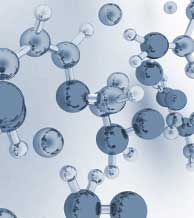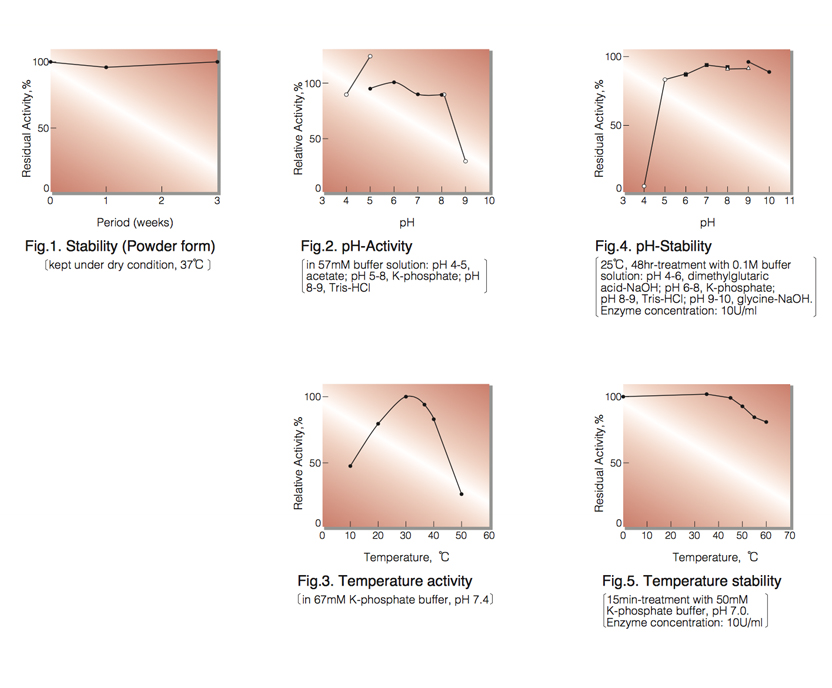D-LACTATE DEHYDROGENASE from Microorganism
LCD-221
(R)-Lactate : NAD⁺ oxidoreductase (EC 1. 1. 1. 28)
D-Lactate + NAD⁺ ⇆ Pyruvate + NADH + H⁺
| Appearance: | White amorphos powder, lyophilized | ||
|---|---|---|---|
| Activity: | Grade II 900 U/mg-solid or more | ||
| Contaminants: | NADH oxidase ≤1.0×10⁻³% Malate dehydrogenase ≤1.0×10⁻²% GOT ≤5.0×10⁻³% GPT ≤5.0×10⁻³% Myokinase ≤1.0×10⁻²% Pyruvate kinase ≤1.0×10⁻³% |
||
| Stability: | Stable at -20°C for at least One year (Fig.1) |
|---|---|
| Molecular weight : | approx. 140,000 |
| Isoelectric point: | 4.0 |
| Michaelis constant: | 6.4×10⁻⁴M (pyruvate, pH 7.0) |
| Inhibitors : | Ag²+, Hg²+, SH-reagents |
| Optimum pH : | 5.0-7.0 (Fig.2) |
| Optimum temperature : | 30-37°C(Fig.3) |
| pH Stability : | pH 5.0-9.0 (25°C, 48hr) (Fig.4) |
| Thermal stability : | below 45°C (pH 7.0, 15min) (Fig.5) |
| Effect of various chemicals : | (Table 1) |
APPLICATIONS
This enzyme is useful for enzymatic determination of numerous metabolites, e.g. ATP, ADP, glucose, creatinine, pyruvate, lactate and glycerol, and of enzyme activities, e.g. GPT, PK, and CPK when coupled with the related enzymes.
ASSAY
Principle:
D-Lactate dehydrogenase
Pyruvate + NADH +H⁺ ►D-Lactate+ NAD⁺
The disappearance of NADH is measured at 340nm by spectrophotometry.
Unit definition:
One unit causes the oxidation of one micromole of NADH per minute under the conditions described
below.
Method:
| A. Pyruvate solution : | 5.0mM [5.50mg sodium pyruvate (MW=110)/10ml of H₂O] (Should be prepared fresh) |
|---|---|
| B. K-Phosphate buffer, pH 7.4 : | 1.0M |
| C. NADH solution : | 1.0mM [7.63mg NADH・ 2Na (MW=763)/10ml of H₂ O] (Should be prepared fresh) |
| D. Enzyme diluent : | 0.1M K-phosphate buffer, pH 7.4 contg. 0.1% of BSA |
Procedure
| Concentration in assay mixture | |
|---|---|
| K-phosphate buffer | 67 mM |
| Pyruvate | 0.49 mM |
| NADH | 0.098 mM |
| BSA | 16.4µg/ml |
1. Prepare the following working solution (10 tests) in a brownish
bottle, immediately before use and store on ice.
3.0ml Substrate solution (A)
2.0ml K-Phosphate buffer, pH 7.4 (B)
3.0ml NADH solution (C)
22.0ml H2O (D)
2. Pipette 3.0ml of working solution into a cuvette (d=1.0cm) and equilibrate at 25° C for
about 5 minutes.
3. Add 0.05ml of the enzyme solution* and mix by gentle inversion.
4. Record the decrease in optical density at 340nm against water for 2 to 3 minutes in a spectrophotometer
thermostated at 25°C, and calculate the ΔΔOD per minute from the initial linear portion of the curve (ΔOD test).
At the same time, measure the blank rate (ΔΔOD blank) by using the same method as the test except that the enzyme diluent is added instead of the enzyme solution.
* Dilute the enzyme preparation to 0.2-1.0U/ml with ice-cold enzyme diluent (D), immediately before assay.
Calculation
Activity can be calculated by using the following formula :

ΔOD/min(ΔOD test–ΔOD blank)× Vt× df
Volume activity (U/ml) = = ΔOD/min× 9.81× df
6.22× 1.0× Vss
Weight activity (U/mg)=(U/ml)×1/C
- Vt
- : Total volume (3.05ml)
- Vs
- : Sample volume (0.05ml)
- 6.22
- : Millimolar extinction coefficient of NADH (㎠/micromole)
- 1.0
- : Light path length (cm)
- df
- : Dilution factor
- C
- : Enzyme concentration in dissolution (C mg/ml)
REFERENCES
- C.A.Loshon, R.B.McComb, L.W.Bond, G.N.Bowers, Jr.W.H.Coleman and R.H.Gwynn; Clin.Chem., 23, 1576 (1977).
- H.Taguchi, M.Machida, H.Matsuzawa and T.Ohta; Agric.Biol.Chem., 49(2), 359 (1985).
- F.Gasser, M.Doudoroff, and R.Contopoulos; J.Gen. Microbiol. 62, 241 (1970).
| Chemical | Conc.(mM) | Residual activity(%) |
Chemical | Concn.(mM) | Residual activity(%) |
|---|---|---|---|---|---|
| None | − | 100 | MIA | 2.0 | 92.4 |
| Metal salt | 2.0 | NaF | 2.0 | 98 | |
| MgCl₂ | 100 | NaN₃ | 20 | 97.2 | |
| CaCl₂ |
96.3 | EDTA | 5.0 | 96.0 |
|
| Ba(OAc)₂ | 95.8 |
o-Phenanthroline | 2.0 | 98.0 | |
| FeCl₃ | 94.4 |
α,α′-Dipyridyl | 1.0 | 97.1 | |
| CoCl₂ | 97.3 | Borate | 50 | 97.5 |
|
| MnCl₂ | 96.9 | IAA | 2.0 | 91.6 | |
| Cd(OAc)₂ | 97.2 | NEM | 2.0 | 95.2 | |
| NiCl₂ | 95.5 | Hydroxylamine | 2.0 | 96.3 | |
| CuSO₄ | 94.3 | Triton X-100 | 0.10% | 105.5 | |
| Pb(OAc)₂ | 96.0 | Brij 35 | 0.10% | 104.1 | |
| AgNO₃ | 71.5 | Tween 20 | 0.10% | 106.3 |
|
| Span 20 | 0.10% | 98.2 | |||
| Na-cholate | 0.10% | 102.1 | |||
| SDS | 0.05% | 104.4 | |||
| DAC | 0.05% | 47.6 |
Ac, CH₃CO; MIA; monoiodoacetate; EDTA, ethylenediaminetetraacetate; IAA, iodoacetamide; NEM,
N-ethylmaleimide; SDS, sodium dodecyl sulfate; DAC, dimethylbenzylalkylammonium chloride.

To get a quote, contact us at info@toyobousa.com, or INQUIRY.